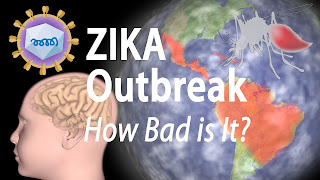ZIKA Virus UPDATE, OMG It Is That Bad
Zika virus is a member of the Flavivirus genus which also includes viruses that cause dengue fever, yellow fever and Japanese encephalitis.
 |
| ZIKA Virus |
How to check health issues at home
The name Zika came from the Zika forest of Uganda, where the virus was first isolated in 1947.
The virus is mainly spread through daytime active Aedes mosquitoes, but can also be transmitted by blood transfusion, via sexual contact, and from an infected mother to the fetus during pregnancy.
Infection with Zika virus is known as Zika fever. Most infected people, however, do not develop any symptoms. In those who do, the symptoms are usually mild and may include: fever, rash, conjunctivitis, joint pain and headache.
The disease commonly clears up on its own after a week and does not require any treatment other than rest. Originally considered a mild disease, Zika fever has been getting a lot of attention lately due to reported connection between the virus and incidents of microcephaly in infants born from infected mothers.
Microcephaly is a serious birth defect where the brain of the newborn is underdeveloped and so smaller than usual. Depending on the extent of the defect, microcephaly may result in a number of neurological disorders, including: seizures, developmental delay, intellectual disabilities, vision and hearing loss.
The problems are usually life-long and may also be life-threatening. The number of infants born with microcephaly has surged 20 folds in the affected areas of the Brazil outbreak, which started in May 2015.
The link between Zika and microcephaly, however, has not been fully proven. Infection in adults has also been linked to Guillain–Barré syndrome, a rare condition characterized by a rapid onset of muscle weakness.
Since the start of its outbreak in Brazil, Zika has spread rapidly to other surrounding countries.
The World Health Organization warned that the virus is likely to spread to nearly all countries of the Americas, except perhaps Canada and continental Chile, where it is too cold for Aedes mosquitoes to survive. Large outbreaks may also be expected in Asia.
There is currently no vaccine for Zika; the best way to prevent the disease is to avoid mosquito bites. Pregnant women are advised not to travel to affected areas and women living in affected countries are advised to delay getting pregnant.











No comments: